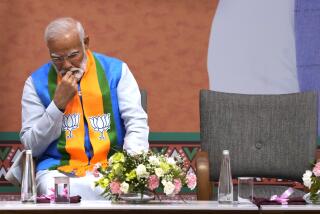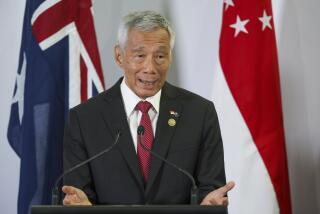No. 2 Man’s Resignation Weakens Indian Leader : Politics: Ruling party may be near a shake-up. Cabinet minister says he could not agree with government’s direction.
- Share via
NEW DELHI — Arjun Singh, the powerful No. 2 figure in India’s government, handed in his resignation Saturday, opening a dangerous breach in Prime Minister P.V. Narasimha Rao’s power base.
The wily politician of the Congress (I) Party, who held the portfolio of human resource development, said disagreements over the current course of Rao’s 3 1/2-year-old government, including how corruption scandals have been handled, compelled him to ask the prime minister to relieve him of his duties.
“I am not doing this in a huff or in anger or frustration,” Singh, 64, told a packed news conference held in a tent on the grounds of his New Delhi home. “But there comes a time when you must put your hand to your heart and decide what you have to do.”
Singh, who said that from now on he will be a simple “Congress worker,” repeatedly denied that his action was motivated by ambition.
“I am not an aspirant for any post occupied by anyone,” he said.
But the resignation placed Singh and Rao in an undeclared race to win over as many government ministers, members of Parliament and high-ranking officials of the Congress (I) Party as possible.
It is a contest that Singh is eminently qualified to take part in, even if Rao, as head of government, seems now to hold most of the trump cards. As chief minister of his native state of Madhya Pradesh from 1980 to 1985, Singh was said by India Today magazine to have polished his policy of “the three Cs: Courtesy, Culture and Conspiracy.”
Depending on the impact of his latest action, a groundswell could well develop in the Congress party to ask Sonia Gandhi, the Italian-born widow of assassinated former Prime Minister Rajiv Gandhi, to take a visible leadership position as a ploy to lure back votes from disgruntled minorities and the poor.
Singh said that would be Mrs. Gandhi’s decision to make, but that if she agreed, it would be a tremendous boost for Congress’ sagging electoral fortunes.
This latest internal tussle in Indian politics could have a wide-ranging impact because of the economic reforms and the courting of foreign capital and business that occupy a central place in the policies of Rao’s government.
Singh said he did not seek to change the major thrust of the reforms, which began in the summer of 1991. But in his letter to Rao, he said that “to bring the economic liberalization policy in tune with the aspirations of the people and to assuage their apprehensions about it, it is necessary to clearly define the steps that we want to take to give a human face to this policy.”
The backdrop to Singh’s resignation is the surprise rout that the Congress party recently suffered in three state elections. The defeats badly shook confidence in Rao as party president, especially since another round of state elections is coming up in February.
On Thursday, Rao dumped three scandal-tainted members of his Council of Ministers. But many in and out of the party, Singh included, thought he should have acted sooner and more energetically.
“A perception has emerged that liberalization of economic policy perhaps has become liberalization in corruption,” Singh said in his letter, which was seven pages long.
*
Renowned as a consummate schemer, Singh did not burn all his bridges with Rao, who has the option of not passing the resignation on to President Shankar Dayal Sharma for action. Singh did not quit his influential seat on the Congress Working Committee, though he claimed that under Rao the party has become “totally paralyzed.”
The bespectacled minister hinted that he could be wooed back to Rao’s side if the government made half a dozen policy changes that he said are “imperative” to restore its credibility. Among them is the formation of panels to investigate the 1992 Bombay securities and stock market scam, the largest in India’s history, and what Singh claims was an official “cover-up” of the circumstances of the death of Rajiv Gandhi, who was killed by a suicide bomber as he led Congress forces in the 1991 election campaign.
More to Read
Sign up for Essential California
The most important California stories and recommendations in your inbox every morning.
You may occasionally receive promotional content from the Los Angeles Times.













